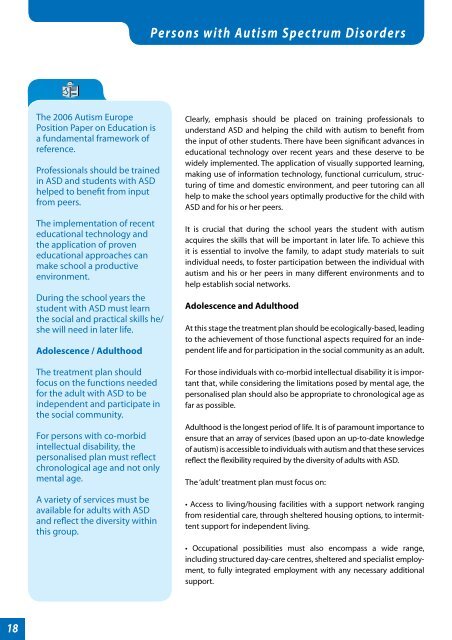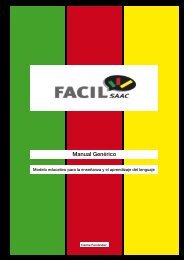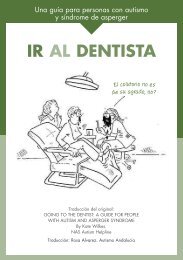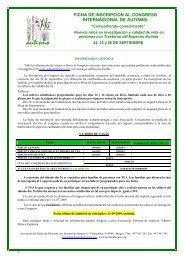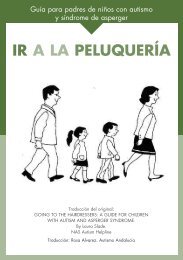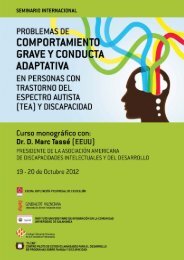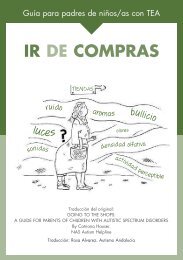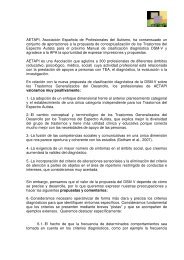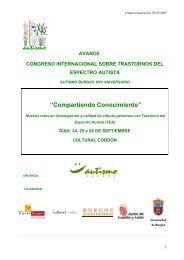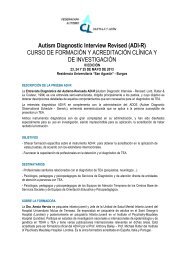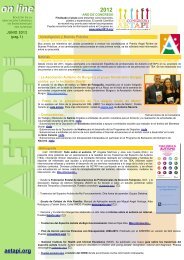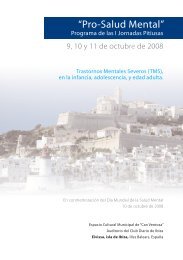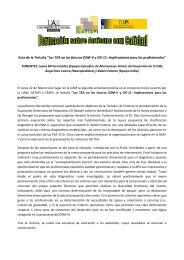persons with autism spectrum disorders - Aetapi
persons with autism spectrum disorders - Aetapi
persons with autism spectrum disorders - Aetapi
You also want an ePaper? Increase the reach of your titles
YUMPU automatically turns print PDFs into web optimized ePapers that Google loves.
18<br />
The 2006 Autism Europe<br />
Position Paper on Education is<br />
a fundamental framework of<br />
reference.<br />
Professionals should be trained<br />
in ASD and students <strong>with</strong> ASD<br />
helped to benefit from input<br />
from peers.<br />
The implementation of recent<br />
educational technology and<br />
the application of proven<br />
educational approaches can<br />
make school a productive<br />
environment.<br />
During the school years the<br />
student <strong>with</strong> ASD must learn<br />
the social and practical skills he/<br />
she will need in later life.<br />
Adolescence / Adulthood<br />
The treatment plan should<br />
focus on the functions needed<br />
for the adult <strong>with</strong> ASD to be<br />
independent and participate in<br />
the social community.<br />
For <strong>persons</strong> <strong>with</strong> co-morbid<br />
intellectual disability, the<br />
personalised plan must reflect<br />
chronological age and not only<br />
mental age.<br />
A variety of services must be<br />
available for adults <strong>with</strong> ASD<br />
and reflect the diversity <strong>with</strong>in<br />
this group.<br />
Persons <strong>with</strong> Autism Spectrum Disorders<br />
Clearly, emphasis should be placed on training professionals to<br />
understand ASD and helping the child <strong>with</strong> <strong>autism</strong> to benefit from<br />
the input of other students. There have been significant advances in<br />
educational technology over recent years and these deserve to be<br />
widely implemented. The application of visually supported learning,<br />
making use of information technology, functional curriculum, structuring<br />
of time and domestic environment, and peer tutoring can all<br />
help to make the school years optimally productive for the child <strong>with</strong><br />
ASD and for his or her peers.<br />
It is crucial that during the school years the student <strong>with</strong> <strong>autism</strong><br />
acquires the skills that will be important in later life. To achieve this<br />
it is essential to involve the family, to adapt study materials to suit<br />
individual needs, to foster participation between the individual <strong>with</strong><br />
<strong>autism</strong> and his or her peers in many different environments and to<br />
help establish social networks.<br />
Adolescence and Adulthood<br />
At this stage the treatment plan should be ecologically-based, leading<br />
to the achievement of those functional aspects required for an independent<br />
life and for participation in the social community as an adult.<br />
For those individuals <strong>with</strong> co-morbid intellectual disability it is important<br />
that, while considering the limitations posed by mental age, the<br />
personalised plan should also be appropriate to chronological age as<br />
far as possible.<br />
Adulthood is the longest period of life. It is of paramount importance to<br />
ensure that an array of services (based upon an up-to-date knowledge<br />
of <strong>autism</strong>) is accessible to individuals <strong>with</strong> <strong>autism</strong> and that these services<br />
reflect the flexibility required by the diversity of adults <strong>with</strong> ASD.<br />
The ‘adult’ treatment plan must focus on:<br />
<br />
from residential care, through sheltered housing options, to intermittent<br />
support for independent living.<br />
<br />
including structured day-care centres, sheltered and specialist employment,<br />
to fully integrated employment <strong>with</strong> any necessary additional<br />
support.


